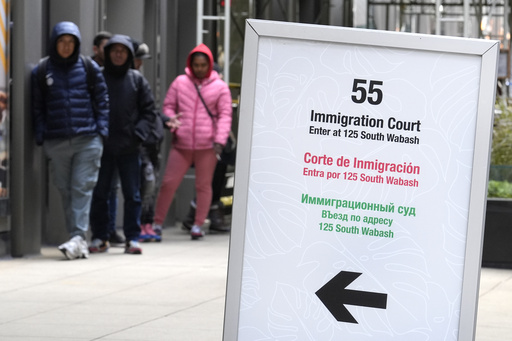Two days after nonprofit organizations filed a lawsuit against the federal government concerning a stop-work order that impacted programs designed to support individuals facing deportation, the U.S. Justice Department decided to reverse its position, reinstating funding for these essential services.
The four federally funded initiatives provide critical information and guidance to individuals in immigration courts and detention facilities, helping them understand their rights as well as the intricate legal procedures involved. On January 22, the Justice Department instructed the nonprofits to halt all activities related to these programs, citing an executive order aimed at combating illegal immigration that had been signed by President Donald Trump on the day of his second inauguration.
In response to the stop-work directive, a coalition of nonprofit groups took legal action on Friday, requesting the prompt restoration of these vital services. By Sunday afternoon, the Justice Department had rescinded the order affecting all four programs.
Nonprofit organizations expressed grave concerns about the lack of access to these programs, as they believed it left individuals to navigate the legal system without support. They feared that this situation would lead to violations of due process rights and further exacerbate the backlog in immigration courts.
The repercussions of the stop-work order were rapidly becoming apparent within just over a week of its implementation. Ruby Robinson, a managing attorney at the Michigan Immigrant Rights Center, visited the Detroit immigration court to notify individuals that assistance provided by their help desk was unavailable. As a result, many people, who otherwise would have received support, were turned away.
Despite the suspension of federal funding, staff members from the Amica Center for Immigrant Rights attempted to continue their essential services at a Virginia detention facility. However, they were removed after speaking with approximately two dozen individuals since the stop-work order had been issued, according to Amica’s executive director, Michael Lukens.
In Chicago, attorneys managing a help desk within the busy immigration court provided vital assistance to over 2,000 individuals in 2024 alone. Initially launched with private funds in 2013, the initiative expanded three years later when it received federal support.
After the imposition of the stop-work order, the organization had begun offering reduced services, yet there were concerns about how long this would be feasible without federal funding. Spokesperson Tara Tidwell Cullen noted the uncertainty surrounding the available resources to continue their operations.
Several nonprofit organizations indicated that signage informing individuals about their services and legal assistance hotline numbers had been removed from detention facilities as a result of the order. The federal government allocates $29 million annually to support the four programs: the Legal Orientation Program, the Immigration Court Helpdesk, the Family Group Legal Orientation, and the Counsel for Children Initiative. This funding is distributed among various organizations nationwide delivering these crucial services, with broad bipartisan backing.
These programs, which have received criticism from Trump during his previous term, faced a swifter and more definitive action this time. In 2018, former Attorney General Jeff Sessions announced similar funding cuts, but concerted legal challenges from service organizations and support from bipartisan lawmakers prompted the Justice Department to retract that decision.
This latest development unfolded remarkably quickly, with the stop-work order issued mere hours before becoming effective and program workers prohibited from entering detention facilities.
Within the realm of immigration law, complexities abound, and unlike criminal courts, there is no entitlement to legal representation for those unable to afford it. Consequently, many individuals must navigate the convoluted system without professional assistance. The U.S. immigration courts are currently facing a staggering backlog of approximately 3.7 million cases, leaving many immigrant petitioners waiting for prolonged periods.
Informing individuals about the legal process can expedite proceedings, enabling judges to avoid reiterating basic procedures for each case presented. Additionally, when individuals are adequately prepared, it can lead to reduced congestion at immigration court filing windows, as they will know how to complete the necessary paperwork accurately.
This knowledge empowers individuals to make informed decisions, whether to proceed with their case when aware of the potential risks or to opt against a courtroom struggle if they deem relief unavailable, according to Edna Yang, co-executive director of American Gateways, which operates in three detention centers and the San Antonio immigration court.
These nonprofit organizations play an essential role in safeguarding due process rights, notifying individuals of impending deadlines, ensuring translation services are accessible, and preventing the wrongful deportation of asylum seekers who may be returned to life-threatening circumstances.
A 69-year-old Venezuelan woman, who arrived in the U.S. in May 2024 after spending four years in Mexico, expressed fear about her ongoing immigration case. The woman utilized a government app to secure an appointment and subsequently filed for asylum, citing threats to her life as a political dissenter. Unfortunately, when she visited the help desk operated by Estrella del Paso at the El Paso immigration court, she found it shuttered due to the stop-work order.
This unexpected closure left her feeling isolated and anxious about potentially needing to spend her caregiver salary to seek assistance for an impending court date later in the month.



